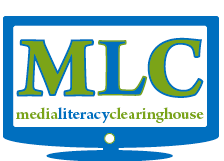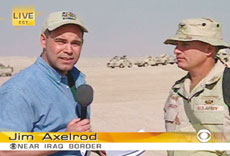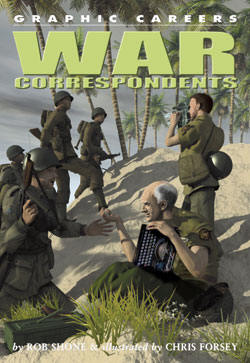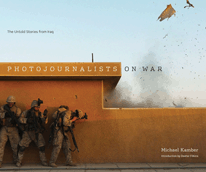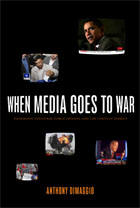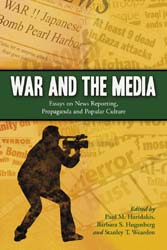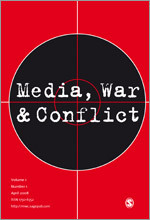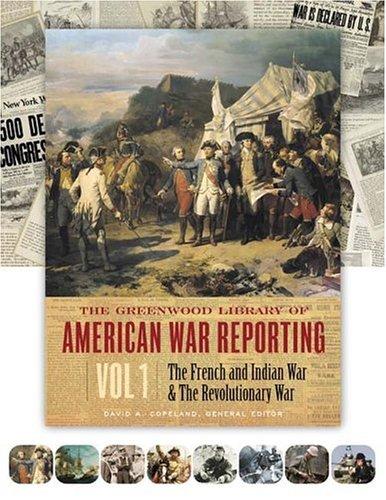NOTE to Teachers: it is critically important that students get their news from MORE than one source.
So if your students are only receiving/reading the ONE newspaper (or watching ONE newscast) that
comes into your school, then they are terribly misinformed. With the web, there are some great sources of info.
I suggest the following:
– BBC Radio/TV
– Globalvision News Network
– Alternet
– Mediachannel
– Christian Science Monitor newspaper
– World News Sources
|
|
|
|
| A Media Education Approach to Teaching/Talking About The War published here courtesy and permission of Canadian media educator Chris WorsnopAt a time when our list is filled with posts about war and seems as if it might become a funnel for a single point of view, I want to offer an activity that teachers might be able to use as a media education activity while perhaps avoiding some of the posturing that endangers classroom discussion of sensitive issues. The objective in a media class should be to come to conclusions and insights about the media rather than to adopt certain positions or opinions, no matter how clearly correct people might consider these positions.Start with a question such as: “How are the news channels doing?” Let the discussion flow freely for a little while. Then – if the class does not do this for you first – contextualize the question by taking a trip through the key concepts of media education : |
- AP: Media had wide access in Vietnam War
- Battlefield Bylines (PBS Newshour)
- Being There (CJR, March/April 2003)
- Beyond Blame: Reacting to the Terrorist Attack
-
Cable News Goes to War: Is Objectivity a Casualty (Harvard: video stream)
- Committee to Project Journalists
- Correspondents Reflect on the War in Iraq (Oct. 2011)
- Coverage of War & Terror 2001-2004 (Nieman Reports)
- Covering War (Talk of the Nation see show for 3/18)
- Covering War & Terrorism (RTNDA)
- Critical Media Literacy In Times of War
- Curtains Ordered for Media Coverage of Returning Coffins (10/21)
- Death, carnage shouldn’t be erased from war coverage (NYT)
- Death photo of reporter Ernie Pyle found
- Embedded reporting influences war coverage, study shows
- Eye of The Beholder (Mideast War reporting-PBS Newshour Aug. 2006)
- For Pentagon and News Media, Relations Improve With a Shift in War Coverage (Jan 2008)
- Frustrated reporters locked out of Gaza war zone (January 2009)
- Helping Students Understand the Mediated Communications of News of War
- How to Sell A War (8/4/03)
- The Inner Lives of Wartime Photographers (May 2011)
- In War, Quest for Balance is Also A Battlefield (August 2006)
- Iraq & The Media (Fairness & Accuracy in Reporting)
- Journalists Are Assigned to Accompany US Troops (NYT, 2/28/03)
- Journalists Spar Over Media Coverage of War With Iraq (3/04)
- Lesson plan: International Conflict & The Media
- Lesson Plan: That’s News to Me: Examining the Escalating Violence in Iraq through Reporting
- Lesson Plan: Reporter’s Notebook: Imagining the Life of a War Correspondent in Iraq
- Lesson Plan: Reporting on Conflict (BBC)
- Lights, Camera, Get Ready For War (USA Today 3/10)
- Living Room Ambassadors
- ‘The Man Who Sold the War’: Marketing Iraq (NPR, 12/05)
- Media Alliance
- Media Casualities (Mother Jones, Aug.19)
- Media Coverage of the War (PBS Newshour)
- Media Coverage of Iraq Called “Shameful” By Peers (4/11/04)
- Media Knocked for Iraq War Coverage (2/04)
- The Media & The Military (Nov.2004)
- The Media & The Military
- Mediating Terrorism
- Media War Watch
- Media Workers Against War
- Military Reporters & Editors organization
- Movie Men Add Special Effects To War (3/11/03)
- News Industry Plans for War (NYT, 2/10/03)
- Portraits of war
- Recent Wars Present Challenges for Media Coverage (2/04)
- Reporters in Iraq Face Danger on Many Fronts (9/25)
- Reporting In The Time Of Conflict
- Taking Sides A Critical Look at War Reporting
- Teaching About The War (March 2003)
- Teaching Media Literacy Through the Topic Of Terrorism
- The perfect storm? The American media and Iraq
- Preparing for War (AJR, March 2003)
- The Press Goes to War (WPR)
- Pros & Cons of Embedding (PBS Newshour)
- A reporter looks back on invasion of Iraq March 2013
- Reporters at War (Discovery Times Channel TV series)
- Reporting America At War (PBS series)
- Reporting from the Frontlines: 100 Years of War Reporting
- The Risks of War Reporting (Lesson Plan, 2011)
- Shooting Under Fire: The World of the War Photographer (book)
- Surviving Conflict Photography
- Truth Was First Casualty in Iraq War (Jan 08 study)
- US use of media in war sparks debate (12/04)
- US To Spread Disinformation
- Wartime journalism comes full circle as Iraqi girl sees iconic photo (May 2011)
- War and the media ( a resource unit)
- War Dances & Media Complaints (Globalvision News Net)
- War In Iraq Front Pages (Newseum)
- War LIVE (PBS Newshour 3/22)
- War reporters sensitive to the notion of “too much bad news” (Dec. 2007)
- War reporting not all bad news, finds study (Sept. 2010)
- War Resources (RTNDA)
- War Stories (Newseum exhibit)
- Why Journalists Risk Their Lives To Cover Iraq (June 2006)
- Witness To War Unembedded Photojournalism in Iraq (book review)Recommended Resources:

Book/CD Combination
Sourcebooks
ISBN: 1402200269
Media Construction of War
A Critical Reading of History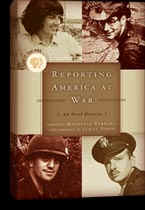
Reporting America
At War
(PBS series companion)
Publisher: Hyperion
ISBN: 140130072
Link
Televising War:
From Vietnam to Iraq
Continuum International
Publishing Group
ISBN: 0826473059
The Weekly War
Newsmagazines & Vietnam
by James Landers
Univ.Missouri Press
ISBN: 0826215343
Read moreMedia Construction
of the Middle East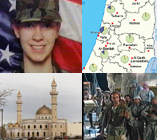
A free, multimedia online media literacy curriculum kit for use with high school students. Covers core social studies content through the decoding of maps, songs, timelines, cartoons, encyclopedia entries, textbooks, magazines, newspapers, movies, documentaries and more. To receive a free CD/DVD package of these materials as soon as they are available, complete an order form.
Teacher Carrie McLaren offers these different versions of one news story for comparison and contrast.
Recommended Resources:
The Censored War: American Visual Experience During World War II (1993)
George H. Roeder, Jr. Yale Univ. Press ISBN: 0-300-06291-5
Desert Storm and the Mass Media (1993). Edited by Bradley S Greenberg and Walter Gantz.
Hampton Press. ISBN: 1-881303-35-7;
Media and the Gulf War: a case study (1991) Ontario Association for Media Literacy. This 19-page booklet
encourages critical thinking and media literacy skills through an examination of the Gulf War media coverage.
It includes chapters on mainstream and alternative media coverage, the “manufacturing of consent” and the
representation of the war. Available from the Association for Media Literacy, 40 McArthur Street,
Weston, Ontario, Canada, M9P 3M7. Tel: (416) 394-6992; Fax: (416) 394-6991; Email: loon@maple.net
—————————————————————————————————
Links for Educators on Terrorism, News, and Media Literacy
